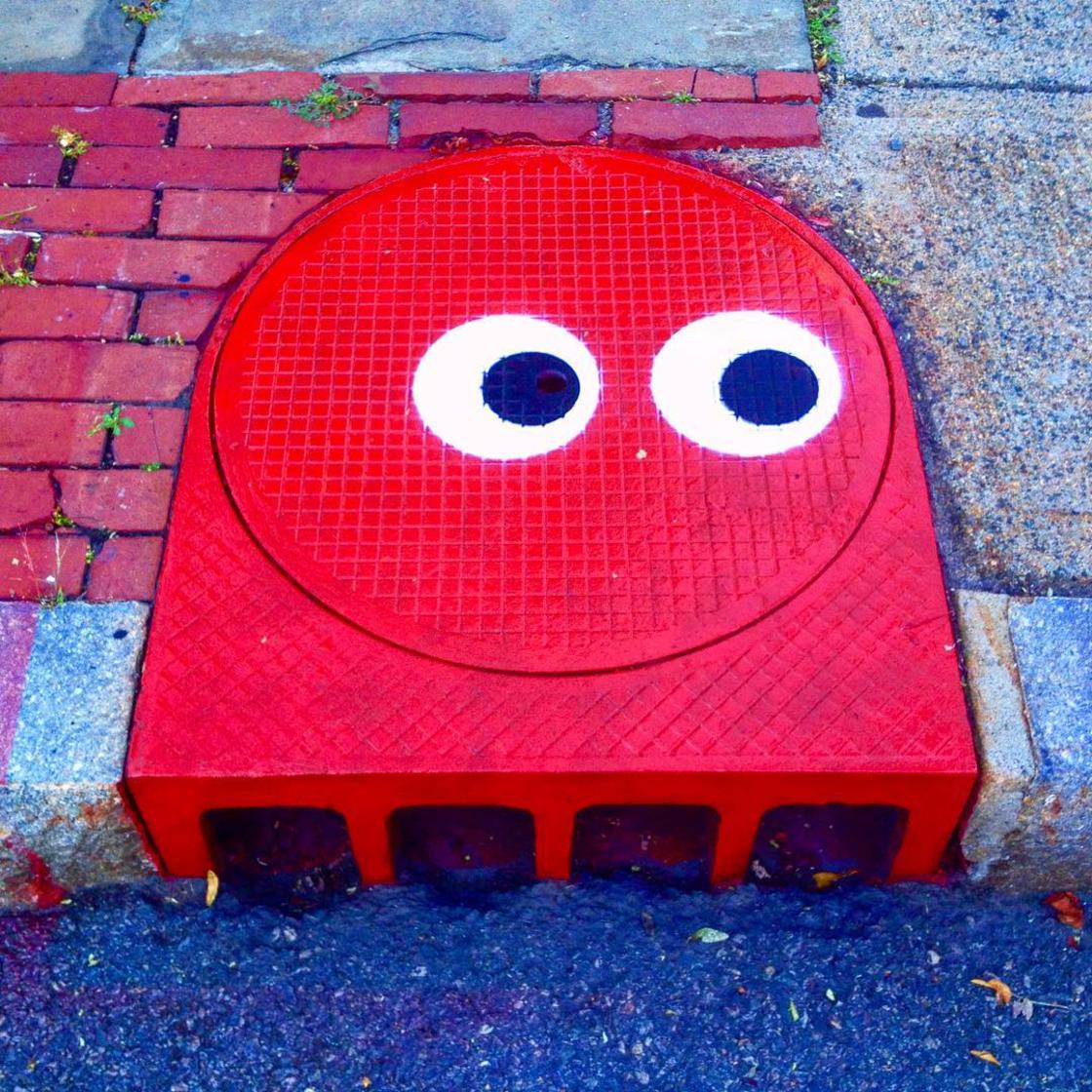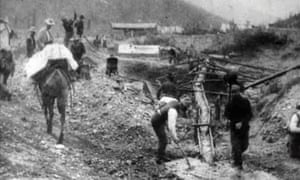via Boing Boing by Andrea James

Street artist Tom Bob has made it his mission to turn a world full of drab and unremarkable little corners into charming moments with his brightly-colored re-renderings.
Continue reading
=============================
via the Guardian by Christina Newland

Washing Gold on 20 Above Hunter, Klondike, 1901, and image from Dawson City: Frozen Time. Photograph: Kino Lorner/Everett Collection/Alamy
In 1978, in north-west Canada’s Yukon territory, construction on a new recreation centre was under way in a small rural settlement called Dawson City. As bulldozers tore up the ground where the previous sports hall had stood, a remarkable discovery came to light: hundreds of reels of ancient nitrate film. Some 533 silent films were recovered, including newsreels and features of all types, dating from the 1910s and 20s. Most were previously unknown to film scholars or thought to be totally lost. But for 49 years the inhospitable cold of the Yukon landscape had safely protected the films – which had been found at the bottom of an old swimming pool.
Continue reading
=============================
via Interesting Literature
The best starry poems
Stars, like flowers and the moon and sunsets, are part of the ‘paint-by-numbers’ poetry toolkit: if you want to write a passable poem that sounds consciously ‘poetic’, you can, as S Club 7 put it, reach for the stars. But poets throughout the centuries have put the stars to more thoughtful and interesting use than mere poetic decoration, offering songs in celebration of the starry firmament and more pessimistic takes on the stars in the sky and what they tell us about ourselves.
Continue reading
=============================
The political consequences of Norman Mailer and Norman Podhoretz’s friendship
via Arts & Letters Daily: Paula Marantz Cohen for The Smart Set
We all know that a book can change the shape of history. Think The Communist Manifesto and Introductory Lectures on Psychoanalysis, not to mention the Bible and the Koran. But a book review? How much influence could a book review possibly have?
Judging from Norman Mailer’s review of Norman Podhoretz’s 1967 memoir, Making It, a lot. Serving as a catchall and a coda for the collective judgment of liberal intellectuals of the day, Mailer’s review would help turn Podhoretz against his progressive roots and harness his exceptional energy and intellect on behalf of neoconservatism, a movement that played a role in the election of Ronald Reagan, the two Bushes, and Donald Trump.
Continue reading
=============================
an article by Tim Ashley for the Guardian

A spy in the house of love … Andrea Carroll as MéŽlisande, William Davies as Yniold and Jonathan McGovern as PelléŽas. Photograph: Tristram Kenton for the Guardian
We tend to think of Debussy’s symbolist tragedy primarily as a hermetic work, examining half-voiced, festering emotions in an aristocratic world remote from the mundane. But are we right to do so? And if not, then what is the external reality that its protagonists so carefully seek to avoid? These are some of the questions posed by Michael Boyd’s new staging, a striking achievement that blends tradition with innovation to shed fresh light on the opera’s complexities.
Continue reading
=============================
via Boing Boing by Caroline Siede
=============================
via The National Archives blog by Dr Juliette Desplat
‘A rose by any other name would smell as sweet.’ Or would it? In 1933, the Persians asked governments around the world to make slight adjustments to the way in which they referred to their country and ruler. In 1934, they informed foreigners that from 21 March 1935 Persia should be officially called Iran.
This may sound like reasonable requests given the Persians (or Iranians, as they were to be called) had been calling their country this for, well, ever. The Foreign Office, however, didn’t see it that way.
On 1 December 1933 the Oriental Secretary in Tehran, Trott, sent a memo on the change of titles requested by the Persians, and its importance. The Persians, he explained, wanted their country to be referred to as the Imperial Persian State and their ruler, the Shah, to be acknowledged as Sháhinsháh (King of Kings), a title used since Antiquity. ‘It is arguable,’ he wrote, ‘that the Persians are entitled to decide for themselves what their State and their Government should be called.’
However, he continued, the British Government had never used these names in the past, and it was clear it was merely ‘an attempt to magnify the importance of the Persian Government through the re-adoption of an ancient appellation’ (FO 371/17890).
The story goes through a lot of what we in the present age would probably see as silliness [interesting reading though] and ends with this:
But at least, in 1952, confirmation was given that it should be safe enough to speak of the Shah of Iran but stroke Persian cats, on Persian rugs.
Read for yourself
Because my father was working in Abadan for the Anglo-Iranian Oil Company in the late 40s and up to nationalisation of the oil company I thought I would look that up too.
…
The immediate consequence was that the Iranian oil business was brought to a standstill, as the Britons who operated the Abadan refinery left the country and the international oil companies, supported by the British and American governments, refused to buy or transport Iranian oil.
Full story
I was discussing this with my husband who said, “that sounds like what Robert Mugabe did to the white farmers”.
=============================
via OUP Blog by Charles M. Wynn Snr and Arthur W. Wiggins

Ball by FeeLoona. Public domain via Pixabay.
Can magicians (illusionists) really levitate themselves and others or bend spoons using only the power of their mind? No. Emphatically no. But they surely make it seem as if they can.
Enjoy being fooled? Then you’ll love watching really good magic shows that allow people the opportunity to suspend their disbelief momentarily. But don’t let this suspension become permanent.
Continue reading
=============================
via 3 Quarks Daily: Hannah Atkinson in The F Word
Meena Kandasamy’s When I Hit You opens one of those huge great wounds. Based on her own experiences, she weaves a tale of a young wife and her abuser in India. Taken away from her family and isolated from her friends, her husband, a political revolutionary, quickly goes from controlling to violent, to eventually a very real threat to her life. Kandasamy’s poetic style jars with the violence she depicts, creating an increasingly uncomfortable read, yet one I was unable to put down. Although our narrator remains nameless, and in some ways quite distant, her thoughts became my own. She is a writer, and one of the most powerful narrative tools is her journey to completely losing her voice. Her abuser starts by removing her from social media, and it spirals from there, until she is silent. As the narrative switches from her husband to past lovers and relationships, we see her outgoing personality and vivacity, putting her silence into shockingly stark contrast.
Continue reading
=============================
via Boing Boing by Caroline Siede
The YouTube channel Today I Found Out takes a look at the life of famed PBS artist Bob Ross – a beloved public figure whose biography is surprisingly opaque.
No comments:
Post a Comment